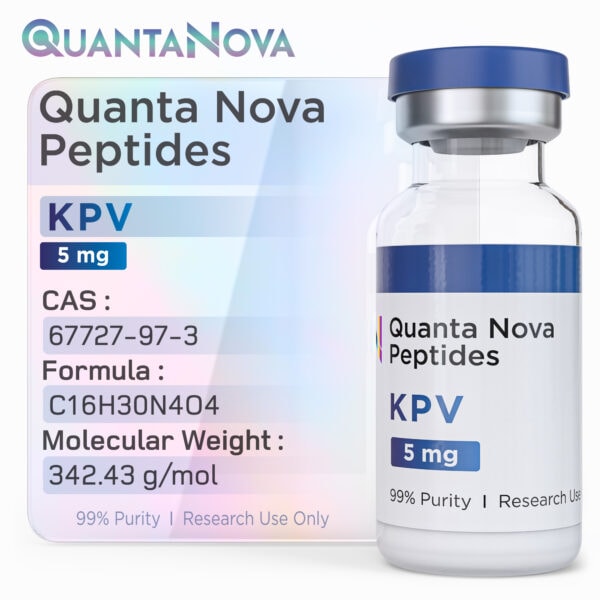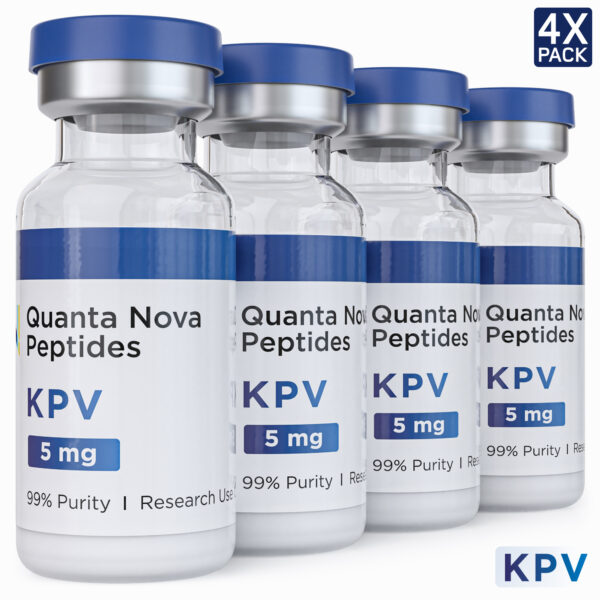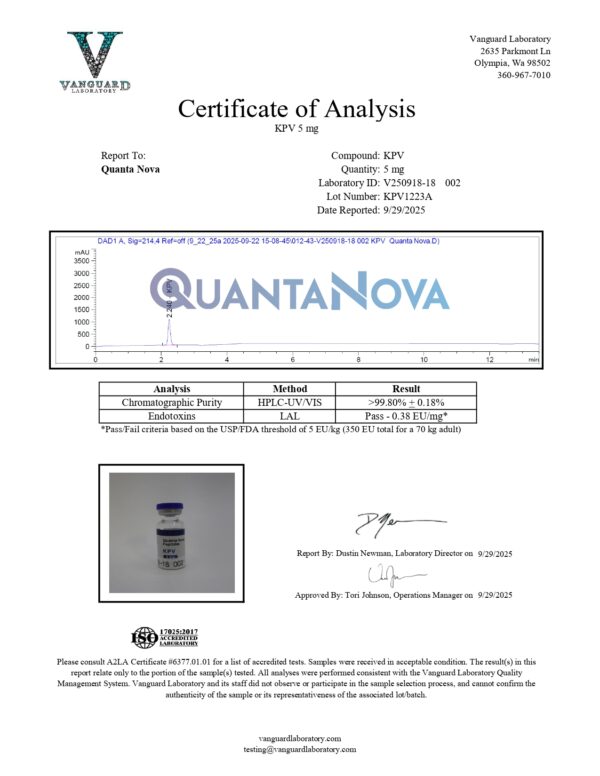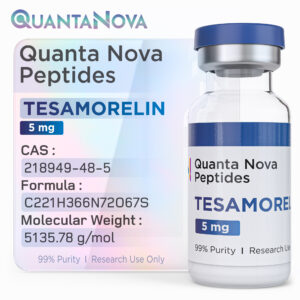Description
Product Overview
QuantaNova’s KPV peptide 5mg comes in a 4-vial bundle of lyophilized powder. Each vial is freeze-dried in-house using a proprietary lyophilization process that enhances stability during transit and storage, allowing for up to 30 days of shelf life before refrigeration is necessary. This ensures optimal peptide integrity across cold and warm cycles during transit.
All batches undergo PES micron filtration to eliminate the potential for bacterial contamination. To confirm research-grade purity and consistency, each lot is tested by Vanguard Laboratory, an ISO-certified third-party lab that verifies Identity, Purity, Quantity, and Bacterial Endotoxins. QuantaNova’s in-house quality control ensures reliable, reproducible results for professional research environments.
KPV Peptide Structure
- Amino Acid Sequence: Lys-Pro-Val
- Molecular Formula: C17H32N6O4
- Molecular Weight: 384.48 g/mol
- CAS Number: 122853-36-1
Key Findings of KPV Peptide
- Studied for its potential role in modulating inflammatory responses
- Explored for effects on epithelial barrier stability and mucosal immunity
- Investigated in models of wound healing and accelerated skin repair
- Researched for influence on scar formation and fibrosis regulation
- Evaluated in gut inflammation models such as colitis and IBD
In-Depth Research Applications of KPV Peptide
Anti-Inflammatory Pathway Regulation
KPV is a tripeptide fragment derived from alpha-MSH, which has been extensively studied for its ability to reduce pro-inflammatory cytokines, such as TNF-α and IL-6, in vitro. Its mechanism has been linked to the inhibition of NF-κB signaling, making it a valuable peptide in inflammation-focused research across various tissue models, including the skin and intestines.
Wound Healing and Tissue Recovery
Preclinical studies have shown KPV to accelerate wound closure rates and support re-epithelialization in injured tissue. Its anti-inflammatory action contributes to reduced swelling and improved tissue remodeling, potentially lowering the risk of hypertrophic scarring or fibrosis. These features make it ideal for models investigating skin regeneration, surgical recovery, or trauma response.
Scar Formation and Fibrosis Modulation
KPV’s regulatory influence over fibroblast activity has drawn attention in research surrounding scar formation. It has been observed to help balance collagen production and remodeling in post-injury conditions, facilitating healthier tissue structural recovery. These effects are being actively studied in models of dermal injury and long-term tissue repair.
Gastrointestinal and Epithelial Studies
KPV has demonstrated protective effects in animal models that simulate inflammatory bowel diseases (IBD), including colitis. Data shows its ability to help restore epithelial integrity and reduce ulceration under chemical or immune-induced stress. These findings support its expanding role in mucosal barrier and GI inflammation research.
Resources
-
Anti-Inflammatory Pathway Regulation
-
Wound Healing and Tissue Recovery
-
Scar Formation and Fibrosis Modulation
-
Gastrointestinal and Epithelial Studies
Usage & Storage Guidelines of KPV
- Handle using appropriate laboratory safety procedures.
- Storage (Lyophilized): Store at -20°C.
- After Reconstitution: Store between 2–8°C and use within 14–30 days.
- Diluent Recommendation: Reconstitute with bacteriostatic water or a suitable research-grade diluent.
Legal Disclaimer
This product is intended strictly for laboratory research purposes only. It is not a drug, food additive, cosmetic, or therapeutic substance, and must not be used in humans or animals. It is the buyer’s responsibility to handle the product safely and in accordance with applicable laws and regulations.









This KPV peptide arrived promptly and was packaged professionally. The vials were sealed with silicone stoppers and the lyophilized powder had a clean white appearance. Great Company